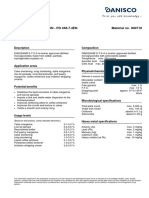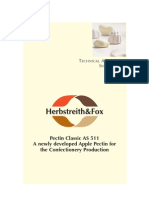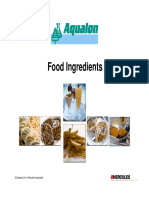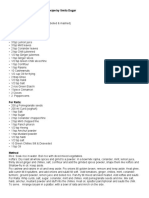0 ratings0% found this document useful (0 votes)
152 viewsBAKEZYME
BAKEZYME
Uploaded by
wardan gBakezyme P is a fungal amylase that improves several qualities of bread when added to flour, including increased loaf volume, improved dough machinability, and a better appearance of loaves. It ensures the flour has sufficient amylase activity for breadmaking and is devoid of proteolytic activity that can affect gluten elasticity. Bakezyme PS and PFP contain additional fungal and bacterial proteases and further improve qualities such as taste and crust color. Various Bakezyme products provide different benefits depending on the type of product, such as increased crumb softness for cakes or improved rheology for biscuits and crackers.
Copyright:
© All Rights Reserved
Available Formats
Download as PDF, TXT or read online from Scribd
BAKEZYME
BAKEZYME
Uploaded by
wardan g0 ratings0% found this document useful (0 votes)
152 views2 pagesBakezyme P is a fungal amylase that improves several qualities of bread when added to flour, including increased loaf volume, improved dough machinability, and a better appearance of loaves. It ensures the flour has sufficient amylase activity for breadmaking and is devoid of proteolytic activity that can affect gluten elasticity. Bakezyme PS and PFP contain additional fungal and bacterial proteases and further improve qualities such as taste and crust color. Various Bakezyme products provide different benefits depending on the type of product, such as increased crumb softness for cakes or improved rheology for biscuits and crackers.
Original Description:
ekmek
Copyright
© © All Rights Reserved
Available Formats
PDF, TXT or read online from Scribd
Share this document
Did you find this document useful?
Is this content inappropriate?
Bakezyme P is a fungal amylase that improves several qualities of bread when added to flour, including increased loaf volume, improved dough machinability, and a better appearance of loaves. It ensures the flour has sufficient amylase activity for breadmaking and is devoid of proteolytic activity that can affect gluten elasticity. Bakezyme PS and PFP contain additional fungal and bacterial proteases and further improve qualities such as taste and crust color. Various Bakezyme products provide different benefits depending on the type of product, such as increased crumb softness for cakes or improved rheology for biscuits and crackers.
Copyright:
© All Rights Reserved
Available Formats
Download as PDF, TXT or read online from Scribd
Download as pdf or txt
0 ratings0% found this document useful (0 votes)
152 views2 pagesBAKEZYME
BAKEZYME
Uploaded by
wardan gBakezyme P is a fungal amylase that improves several qualities of bread when added to flour, including increased loaf volume, improved dough machinability, and a better appearance of loaves. It ensures the flour has sufficient amylase activity for breadmaking and is devoid of proteolytic activity that can affect gluten elasticity. Bakezyme PS and PFP contain additional fungal and bacterial proteases and further improve qualities such as taste and crust color. Various Bakezyme products provide different benefits depending on the type of product, such as increased crumb softness for cakes or improved rheology for biscuits and crackers.
Copyright:
© All Rights Reserved
Available Formats
Download as PDF, TXT or read online from Scribd
Download as pdf or txt
You are on page 1of 2
Bakezyme ®
BAKEZYME® P: • A further increase in loaf volume
Fungal amylase for general improvement of bread • An improved dough machinability
quality.
• A better general appearance of the loaves
Bakezyme® P is a fungal alpha-amylase prepara- (crust color and loaf symmetry)
tion obtained by cultivating a selected strain of
Aspergillus oryzae. The following improvements in • A stronger taste and flavor.
bread quality are achieved when incorporating this These quality improvements are obtained in par-
fungal amylase preparation in the flour used for ticular when using Bakezyme® PS or PFP in strong
breadmaking: types of wheat flour. Doughs prepared from this
• Increased loaf volume by improving gas- type of flour often lack the right balance between
retaining capacity of the dough elasticity and extensibility of the gluten protein.
• Improved texture and more uniform crumb
structure
• Darker crust
• Improved crumb softness. Properties of Bakezyme ®
The use of Bakezyme® P ensures that the amy- BISCUITS &
lase activity of flour is sufficient for breadmaking. YEAST-RAISED PRODUCTS CRACKERS
Bakezyme® P is devoid of proteolytic activity, which PS/
BAKEZYME® P PFP H AG BAC B
affects the elastic properties of the gluten protein.
IMPROVEMENT:
In addition, its inactivation at the start of the baking Loaf volume &
process ensures a high degree of reliability when Gas retention ++ ++ +++ +
using this fungal amylase in breadmaking. Taste + ++ + ++ ++
Crust color + ++ + ++ +
BAKEZYME® PS AND PFP: Crumb color ++ ++ +++ +
Tolerance & + ++ +
Fungal amylase/protease for general improvement Dough stability
of bread quality when preparing bread from Crumb texture + + ++
strong flours. Crumb softness ++ ++ +++ +++
Gas production + + + ++
Bakezyme PS and PFP are fungal enzyme
®
Reduction of
preparations, obtained by cultivating selected Mixing time + ++
strains of Aspergillus oryzae. These preparations Machinability of + ++
contain standardized levels of both fungal and a Dough (bread)
low (Bakezyme® PFP) or a high (Bakezyme® PS) Machinability of
Dough (biscuits & ++
protease activity. The additional protease activity Crackers)
in Bakezyme® PS or PFP results in the following
further improvements of bread quality: + improved ++ further improved +++ strongly improved
BAKEZYME® H: BAKEZYME® BAC
Fungal amylase/hemicellulase for additional Bacterial amylase to improve crumb softness of
improvement of loaf volume and crumb softness cakes, muffins, and bread.
and improvement of machinability of high-fiber Bakezyme® BAC is a bacterial amylase, produced
doughs. by cultivating a special strain of Bacillus amylolique-
Bakezyme® H400 is a fungal amylase preparation faciens (also known as Bacillus subtilis). This amy-
containing a standardized level of hemicellulase lase preparation is used to improve crumb softness
(pentosanase) activity, which is produced by culti- of cakes, muffins, and bread by dextrinizing a part
vating a special strain of Aspergillus niger. of the gelatinizing starch during baking.
The additional hemicellulase activity in
Bakezyme® H400 improves bread quality by break- BAKEZYME® B500:
ing down a hemicellulose fraction in the flour. This Bacterial protease for improving rheological prop-
fraction normally absorbs a substantial amount of erties of biscuit and cracker doughs.
water in a dough. The following improvements are Bakezyme® B500 is a neutral bacterial protease,
obtained from the additional hemicellulase activity produced by cultivating a special strain of Bacillus
in Bakezyme® H400: amyloliquefaciens (also known as Bacillus subtilis).
• Improved handling properties of doughs This proteolytic enzyme preparation causes desirable
prepared from flours containing high levels of rheological changes in dough by breaking down the
dietary fiber gluten protein of the flour, which is responsible for
• A substantial further increase in loaf volume the elastic properties of wheat flour dough. The fol-
lowing improvements are obtained from the use of
• Further improvement of keeping quality and this enzyme preparation for the production of bis-
crumb structure of bread.
cuits and crackers:
• Reduction of fermentation time required for
BAKEZYME® AG 800: optimal rheology of dough for yeast-based
Fungal amyloglucosidase preparation for sugar crackers, chappati, and pizzas
replacement in low-sugar doughs. • Replacement of sodium metabisulfite
Bakezyme® AG 800 is a fungal amyloglucosidase
preparation produced by a special strain of • Improved dough machinability, especially
when laminating the dough
Aspergillus niger. The addition of this enzyme to the
flour offers the possibility of reducing the amount of • Regular shape and texture, brighter color, and
sugar in a breadmaking recipe without retarding gas lower density of biscuits and crackers
production in the dough. The following improve- • Reduced friability and checking and prolonged
ments in bread quality are obtained from the addi- freshness of biscuits and crackers.
tion of Bakezyme® AG 800 to the flour:
• Improved loaf volume by improving gas
production in low-sugar doughs
• An increase in the sweetness of bread allowing
a reduction in the amount of sugar in recipes
for low-sugar doughs
• Improved crust color. Bakezyme® is a trademark of Gist-brocades N.V., Delft, Holland.
LALLEMAND INC.
1620 Préfontaine, Montréal, QC H1W 2N8 CANADA • (800) 840-4047 • (514) 522-2133 • FAX (514) 255-6861
AMERICAN YEAST SALES
(800) 432-1090 • (603) 432-4006 • FAX (603) 432-5283
DISTRIBUTED BY AMERICAN YEAST SALES (USA), LALLEMAND DISTRIBUTION (CANADA)
rev 4/98
You might also like
- Ebook PDF Culinary Nutrition Principles and Applications PDFDocument41 pagesEbook PDF Culinary Nutrition Principles and Applications PDFstephen.mays579100% (44)
- Amazing Chewy Bagels From Scratch - Recipe - ChefSteps PDFDocument3 pagesAmazing Chewy Bagels From Scratch - Recipe - ChefSteps PDFVicente Ferraro50% (2)
- Maxilact TechBulletinDocument9 pagesMaxilact TechBulletinandres mNo ratings yet
- Enzymes-SAMSA External 130513 LowDocument8 pagesEnzymes-SAMSA External 130513 LowJonathan Suarez MontoyaNo ratings yet
- Arla SMP Replacer BakeryDocument8 pagesArla SMP Replacer BakeryManuelito Maratas AndayaNo ratings yet
- DSM Enzymes For Biscuits Crackers Wafers PDFDocument19 pagesDSM Enzymes For Biscuits Crackers Wafers PDFOrhan AvurNo ratings yet
- Maxilact LGX - Clean Taste - Lactase HODocument2 pagesMaxilact LGX - Clean Taste - Lactase HOJuan Jose Escobar P.100% (1)
- Agaroles For YogurtDocument8 pagesAgaroles For YogurtRatna WibisonoNo ratings yet
- 2. Pregelatinized Starch in Instant Thick Soup. V5-Đã Chuyển ĐổiDocument1 page2. Pregelatinized Starch in Instant Thick Soup. V5-Đã Chuyển Đổisuongnt2002No ratings yet
- Beverage Application Guide: Cellulose GumDocument4 pagesBeverage Application Guide: Cellulose GumGiorgi Ghambashidze0% (1)
- TB Hydrocolloids FNFN201009Document9 pagesTB Hydrocolloids FNFN201009Yomo OuyaneNo ratings yet
- Grindamyl A 14000Document3 pagesGrindamyl A 14000Toni AcoskiNo ratings yet
- Impact of Different Baking Processes On Bread Firmness and Starch Properties in BreadcrumbDocument12 pagesImpact of Different Baking Processes On Bread Firmness and Starch Properties in BreadcrumbIvana HalingkarNo ratings yet
- Solve Your Bakery Development Challenges: With IngredionDocument6 pagesSolve Your Bakery Development Challenges: With IngredionAndres Giraldo GomezNo ratings yet
- DFS Baking Portfolio - FinalDocument4 pagesDFS Baking Portfolio - Finalwardan g100% (1)
- Enzymes in Baking IndustryDocument21 pagesEnzymes in Baking IndustryAHANA mahboobNo ratings yet
- AS Novozymes Lipopan Prime 2018-21030-01Document4 pagesAS Novozymes Lipopan Prime 2018-21030-01phucnguyentran2002100% (1)
- Arla Ice CreamDocument8 pagesArla Ice CreamBrahmantioNo ratings yet
- Guar Alternatives: For The Bread IndustryDocument2 pagesGuar Alternatives: For The Bread IndustryToni AcoskiNo ratings yet
- Total Titratable Acidity (TTA) of Bread: Solutions and ChemicalsDocument4 pagesTotal Titratable Acidity (TTA) of Bread: Solutions and ChemicalsGA PBNo ratings yet
- PD GRINDAMYL SUREBake 900Document2 pagesPD GRINDAMYL SUREBake 900Toni AcoskiNo ratings yet
- AWT Classic CM 300 Series enDocument5 pagesAWT Classic CM 300 Series enDayana AriasNo ratings yet
- Dimodan S-T K-ADocument3 pagesDimodan S-T K-AHector Castellano Godoy100% (1)
- R.1.5 - Recipe - Gluten-Free MuffinDocument1 pageR.1.5 - Recipe - Gluten-Free MuffinAL MUNA Gluten FreeNo ratings yet
- White Bread With Melopan For Industrial ProductionDocument1 pageWhite Bread With Melopan For Industrial ProductionAbu Raihan100% (1)
- Grindsted Cellulose Gum FZD 150 PDFDocument2 pagesGrindsted Cellulose Gum FZD 150 PDFMustafa AlyousefNo ratings yet
- Solve Your Dairy Development Challenges: With IngredionDocument6 pagesSolve Your Dairy Development Challenges: With IngredionAndres Giraldo GomezNo ratings yet
- The Convenient Way To Freshen-Up Your Bread and Baked Goods: Bakezyme® Master Premium Maltogenic AmylaseDocument2 pagesThe Convenient Way To Freshen-Up Your Bread and Baked Goods: Bakezyme® Master Premium Maltogenic Amylasewardan gNo ratings yet
- Proteria CP - Cultured DextroseDocument2 pagesProteria CP - Cultured DextroseAimin HENo ratings yet
- DSM Enzymes For Biscuits Crackers WafersDocument19 pagesDSM Enzymes For Biscuits Crackers WafersRoxana Larisa Olteanu100% (1)
- Whey PermeateDocument8 pagesWhey PermeateRizal Ainur IchsanNo ratings yet
- AWT Pectin Classic As 511Document3 pagesAWT Pectin Classic As 511Dayana AriasNo ratings yet
- Cremodan SE709 VEGDocument3 pagesCremodan SE709 VEGcampeon00magnatesNo ratings yet
- Technical Information LBGDocument6 pagesTechnical Information LBGEddy WibowoNo ratings yet
- Alginatos DaniscoDocument4 pagesAlginatos DaniscoPaul AgudeloNo ratings yet
- Wafers PresenationDocument12 pagesWafers Presenationsadbad6No ratings yet
- Standard Chocolate Milk Shake@IFFDocument2 pagesStandard Chocolate Milk Shake@IFFsubhra bhattacharjee0% (1)
- Viscozyme: Product Data SheetDocument2 pagesViscozyme: Product Data SheetlucaNo ratings yet
- Stabilizers Acidified Milk Drinks PDFDocument6 pagesStabilizers Acidified Milk Drinks PDFthanhtl_hugolataNo ratings yet
- Natural Hydrocolloids For All Types of TexturesDocument5 pagesNatural Hydrocolloids For All Types of TexturesMarie NguyenNo ratings yet
- Vc622c - Aerowhip - Foam Stabilizers For Use in Whipping CreamDocument8 pagesVc622c - Aerowhip - Foam Stabilizers For Use in Whipping CreampedrazasNo ratings yet
- Unit 11 Softy and Novelties - Definition, Composition, Legal Standards and Method of ManufactureDocument15 pagesUnit 11 Softy and Novelties - Definition, Composition, Legal Standards and Method of ManufactureRonak RawatNo ratings yet
- Product Data Sheet: Novamyl® 1500 MGDocument2 pagesProduct Data Sheet: Novamyl® 1500 MGمحمد صبحيNo ratings yet
- PertenGlutomaticMethod and ApplicationDocument6 pagesPertenGlutomaticMethod and ApplicationSallaNo ratings yet
- Seasoning Formulation: (Snack Food Seasonings Case)Document48 pagesSeasoning Formulation: (Snack Food Seasonings Case)Pitra Charesna100% (1)
- Aerowhip WhipcreamDocument32 pagesAerowhip Whipcreampedrazas0% (1)
- Chemistry of Cake ManufacturingDocument8 pagesChemistry of Cake ManufacturingJobin GeorgeNo ratings yet
- AWT HF Pectins in Egg Free CreamsDocument5 pagesAWT HF Pectins in Egg Free CreamsDayana AriasNo ratings yet
- Influence of Various Hydrocolloids On Cottage Cheese Cream DressingDocument10 pagesInfluence of Various Hydrocolloids On Cottage Cheese Cream DressingLorenzo LeurinoNo ratings yet
- Aerated Food GelsDocument12 pagesAerated Food GelsOana Silvia100% (1)
- Enzymes PDFDocument24 pagesEnzymes PDFOrhan AvurNo ratings yet
- Finamul 97 SSL: Product Data SheetDocument1 pageFinamul 97 SSL: Product Data SheetToni AcoskiNo ratings yet
- AWT FZ Optimale Fruchtverteilung enDocument7 pagesAWT FZ Optimale Fruchtverteilung enDayana AriasNo ratings yet
- Cake With Aquasorb - A500Document0 pagesCake With Aquasorb - A500gauravkl323232No ratings yet
- Palsgaard PGPR 4150Document3 pagesPalsgaard PGPR 4150Boban ThomasNo ratings yet
- Xanthan Gum 2006Document6 pagesXanthan Gum 2006mobeenahadNo ratings yet
- Functional FibreDocument10 pagesFunctional Fibresofia NunesNo ratings yet
- Toffee Food TechnologyDocument19 pagesToffee Food TechnologyNgọc DungNo ratings yet
- Emulgentes para Coberturas de HeladosDocument6 pagesEmulgentes para Coberturas de HeladosMarcos Pozo López100% (1)
- Water Activity in Foods: Fundamentals and ApplicationsFrom EverandWater Activity in Foods: Fundamentals and ApplicationsRating: 5 out of 5 stars5/5 (1)
- Confectionery and Chocolate Engineering: Principles and ApplicationsFrom EverandConfectionery and Chocolate Engineering: Principles and ApplicationsNo ratings yet
- Baking Product Range: Covering All Your Baking NeedsDocument2 pagesBaking Product Range: Covering All Your Baking Needswardan gNo ratings yet
- 2018.08.29 DKSH Brochure FBI IN PDFDocument8 pages2018.08.29 DKSH Brochure FBI IN PDFwardan gNo ratings yet
- DSM Baking Portfolio For Organic Labeling: Source: Euromonitor, SPINS, Mintel GNPDDocument2 pagesDSM Baking Portfolio For Organic Labeling: Source: Euromonitor, SPINS, Mintel GNPDwardan gNo ratings yet
- Our Key Client Products For The Confectionery and Bakery IndustryDocument4 pagesOur Key Client Products For The Confectionery and Bakery Industrywardan gNo ratings yet
- The Convenient Way To Freshen-Up Your Bread and Baked Goods: Bakezyme® Master Premium Maltogenic AmylaseDocument2 pagesThe Convenient Way To Freshen-Up Your Bread and Baked Goods: Bakezyme® Master Premium Maltogenic Amylasewardan gNo ratings yet
- FT at Home With Heston FTDocument26 pagesFT at Home With Heston FThuggoo_sNo ratings yet
- Gastro ObstructDocument6 pagesGastro ObstructkenugodstimeNo ratings yet
- Long Shelf Life Event PresentationDocument140 pagesLong Shelf Life Event Presentationrudiantoyanto28053100% (1)
- Breadmaker Parts Bread Machine Parts Breadmaker SparesDocument3 pagesBreadmaker Parts Bread Machine Parts Breadmaker SparesJudyLong0% (7)
- Spanish Bread Is A Filipino Yeasted Bread Filled With A Lightly Sweet Mix of Butter and SugarDocument3 pagesSpanish Bread Is A Filipino Yeasted Bread Filled With A Lightly Sweet Mix of Butter and SugarprecillaugartehalagoNo ratings yet
- How Chefs Use MathDocument33 pagesHow Chefs Use MathSo Ri0% (2)
- "Chadha Flour Mills": Project Report On Cost Analysis On Setup of A Flour Mill NamedDocument29 pages"Chadha Flour Mills": Project Report On Cost Analysis On Setup of A Flour Mill NamedsubuhkhanNo ratings yet
- 928-Article Text-2162-1-10-20220511Document13 pages928-Article Text-2162-1-10-20220511Umar Farouq Mohammed GalibNo ratings yet
- BREADmaking Self CheckDocument20 pagesBREADmaking Self CheckMemry LaneNo ratings yet
- AP Lab #6 Cellular RespirationDocument7 pagesAP Lab #6 Cellular RespirationAnya KureshiNo ratings yet
- Ig Ol701Document59 pagesIg Ol701Saniya Shaikh100% (1)
- Literature Review On Bread MakingDocument4 pagesLiterature Review On Bread Makingnqdpuhxgf100% (1)
- Supplementary English Activities Grade 8Document117 pagesSupplementary English Activities Grade 8derinkatas41No ratings yet
- The Energy of Foods in Chinese Medicine - CNM College of Naturopathic MedicineDocument12 pagesThe Energy of Foods in Chinese Medicine - CNM College of Naturopathic MedicinePeaceful WarriorNo ratings yet
- Lentil Rice With Anari Yoghurt Recipe by Smita Dugar IngredientsDocument54 pagesLentil Rice With Anari Yoghurt Recipe by Smita Dugar Ingredientsdeepa_ch1397No ratings yet
- Impact of Saccharomyces Cerevisiae Metabolites Produced During Fermentation On BreadDocument51 pagesImpact of Saccharomyces Cerevisiae Metabolites Produced During Fermentation On BreadLeonardo Serrano CalistoNo ratings yet
- HEALTH - Basic Food GroupsDocument8 pagesHEALTH - Basic Food GroupsMichelle Gutierrez Sibayan100% (1)
- STORY OF SEASONS Friends of Mineral Town GUIDEDocument23 pagesSTORY OF SEASONS Friends of Mineral Town GUIDEZalfa ZNo ratings yet
- The Technology of Bread Making - William Jago PDFDocument650 pagesThe Technology of Bread Making - William Jago PDFIoana BurlacuNo ratings yet
- Neff n70 B57cr22nob Manual enDocument36 pagesNeff n70 B57cr22nob Manual enGustavs KrievkalnsNo ratings yet
- The Bulking Grocery List and Sample Meal PlanDocument12 pagesThe Bulking Grocery List and Sample Meal PlanGerard LallyNo ratings yet
- #11 November 2014 CatalogDocument40 pages#11 November 2014 CatalogTessa DavisNo ratings yet
- Bread Fermentation Methods: Simplified Explanation of How Bread ProvesDocument4 pagesBread Fermentation Methods: Simplified Explanation of How Bread ProvesGiuliaNo ratings yet
- Cooking With Paula Deen-Best Casseroles-P2PDocument100 pagesCooking With Paula Deen-Best Casseroles-P2PVictor Vasileniuc67% (3)
- Soal Akm Dan Jawaban Bahasa Inggris Sma SMK Kelas 11Document21 pagesSoal Akm Dan Jawaban Bahasa Inggris Sma SMK Kelas 11rusandi91% (11)
- Chapter 05Document33 pagesChapter 05Muhibullah MuhibNo ratings yet
- Hillbilly Hanks Roadkill RecipesDocument13 pagesHillbilly Hanks Roadkill Recipesmefjak0% (1)





























































































